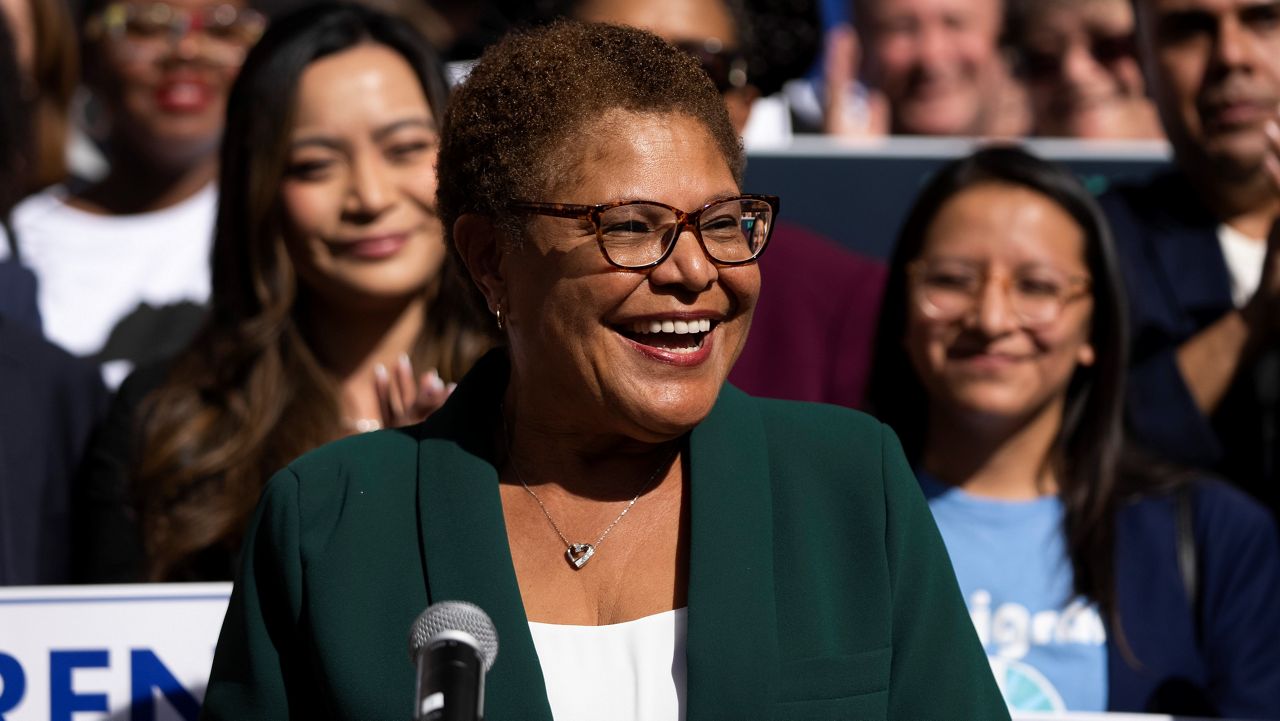LOS ANGELES — This year’s theme for Black History Month is Black Resistance, and for the first time, Los Angeles was opening the celebration on Wednesday with a Black female mayor.
In Karen Bass, who was elected in November, members of the Black community believed they might be taking a step forward, even as race relations remained in turmoil here and across the country.
Joe Paul, the vice president of network partnerships and government relations at the Los Angeles Regional Reentry Partnership, said he is wrestling with this month’s celebration against the backdrop of so much racial unrest.
“Sitting in the space right now and seeing the vestiges of structural violence, structural inequality, the continued remnants — even down to those leaked (City Hall) audio tapes of redlining and segregation… it’s just kind of surreal to be honest, in terms of this year,” he said.
Paul first crossed paths with Bass when she was still a congresswoman, and he says she left an “indelible impression on him” from the beginning.
“It was easy to get behind her effort as mayor because she had such a historical, deep, intimate understanding of the voicelessness in our city,” he said, adding that Bass has continually upheld a strong sense of character through the years.
Paul said he is encouraged by Mayor Bass’ servant leadership approach to healing the community and sees an opportunity for remarkable change.
But that won’t be easy.
Bass is taking the helm of a scandal-mired city facing a host of problems — homelessness and a lack of affordable housing, crime and public safety, race relations and corruption in City Hall, just to name a few.
In a poll conducted in November and December, a majority of voters believe Bass’ policies will improve the city’s problems with homelessness and housing but are less optimistic about the newly elected mayor’s ability to tackle issues of crime and public safety.
While a majority of voters, 51%, said the city is on the wrong track, more than half, 55%, are optimistic about Bass’ ability to bring LA’s diverse communities together, including Michael Lawson, president and CEO of the Los Angeles Urban League.
Lawson has known Bass for over 30 years. The two met before Bass founded the Community Coalition, a nonprofit organization focused on breaking down the barriers between diverse communities within Los Angeles.
Because of the fractions within the city, Lawson believes Bass’ history, character and political experience make her the perfect person to hold the position in this current moment.
“Karen has always been Karen,” he said. “There’s something about Los Angeles that allows this balkanization to continue. This is why she started a community coalition to bridge those gaps. And so, I would suspect that she’s going to take that energy and talent and knowledge and understanding to do this on a citywide basis.”
Lawson believes Bass is in a unique position to move Los Angeles to another plane, but he knows it won't happen overnight.
"She can't do everything at once. She can't do everything, you know in the first hundred days," he siad. "People want to see the results that someone like Mayor Bass can bring about. But the fact of the matter is, she is and has always been a coalition builder. And that's what we need in order to move this city to the next level."
A SoCal native and a self-described “student government nerd,” Divine Johnson currently serves as the external vice president of undergraduate students at UCLA. She has been involved in student government since she was in sixth grade and is inspired by Bass’ appointment.
“Growing up in local and broader politics, you see Black women in leadership roles here and there, but they’re not as prominent as this one. ... So it was really cool to be able to see Bass become the person to not necessarily whisper in those leaders’ ears, but to be the leader that gets the whispers, if that makes sense.”
Bass’ history as a Black woman growing up in Los Angeles, Johnson said, provides her with an invaluable viewpoint that few other politicians have.
Astrid Williams, the Justice Equity & Diversity Leader with Black Women for Wellness, says there is no one better than Bass to help heal racial tensions and elevate Black Angelenos.
“People are really needing to have someone that’s going to represent them and truly be a face — and a voice, I would say — for our community,” Williams said. “Particularly those who are underrepresented. And so with (Bass) holding this office for the city, it is going to bring hopefully massive change for us all.”
Williams says Bass has a unique chance to bring awareness to the issues that affect people of color, including social inequalities, health disparities and discrimination against Black hairstyles. Seeing Bass wearing her natural hair, Williams said, “shows that she’s confident and secure, and also a supporter of what we talk about and what we face.”
Bass is showing her support and putting it in action. She has invited Williams to join a Feb. 9 panel to discuss hair discrimination, toxic Black beauty products, as well as hair justice and safety.
Like many Angelenos, Williams says she looks forward to seeing Bass make great strides in combating the city’s homelessness crisis. As a Black woman, Williams believes Bass can better understand the intersectionality of homelessness, Black womanhood and domestic violence to bring about change.
Williams hopes the celebration of Black History Month will extend beyond February and allow everyone to celebrate the cumulative impacts and rich experiences of Black Americans.
“In the face of everything that’s going — civil unrest and social unrest — just being able to show the good and not just highlight the bad,” she said.



